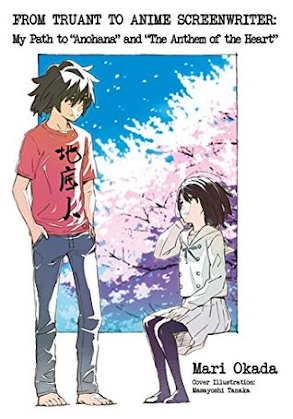Review - From Truant to Anime Screenwriter by Mari Okada
From Truant to Anime Screenwriter is an autobiographical light novel written by Mari Okada. As the title suggests, Okada is a screenwriter of several popular anime and she began life as a "truant." The word that is translated as "truant" carries a greater weight in Japan than it does in America, or at least that's my perception. In both cases a truant refers to someone who refuses to attend compulsory education, but in Japan this seems to be a source of scandal and shame. In America, I haven't sensed the same level of community concern about school attendance. That said, I think even the Japanese "futoku" is really underselling the full scope Okada's struggles.
I need to confess to ignorance of a few things before I delve much deeper into the review. First, I have never watched any of Okada's work. I am aware of "Anohana" and "The Anthem of the Heart" (lit. My Heart Wants to Shout), but I never sought them out. Second, I'm not very familiar with light novels. This is the first book I've ever read that falls into the light novel category. I had an initial impression that light novels were mostly fiction, and well, light. That is to say, I thought they were light in both length and topic. Needless to say I've underestimated the genre, and I suspect I've underestimated Okada's anime as well.
A fair question to ask at this point is: "Ben, why did you read the autobiography of someone you never cared about before." The answer is that I'm interested in the behind the scenes, day-to-day of the anime industry, and also, my threshold for picking up a book is pretty low. I read a lot of random stuff.
Perhaps unsurprisingly, given my complete ignorance of everything about this book, it was not what I expected. From Truant to Anime Screenwriter is a raw, deeply personal depiction of Mari Okada's struggle with serious mental health issues that lead her to near-complete social isolation. A full 2/3's of the book focuses on Okada's struggle to make it through her schooling while battling what she never labels as, but sounds an awful lot like, severe depression and anxiety. This is the "truancy" to which she refers.
Obviously, Okada is able to overcome these challenges to a point and become the screenwriter of the shows that would make her famous in anime circles. She is never fully able to leave her past behind her, though. The remaining third of the book discusses her rise through the ranks of the anime industry to a point where she is able to make personal projects that explore her pain and relationships. All the while Okada remains humble to the point of self-loathing. I can't say that the book ends on a happy note, but maybe it ends on a hopeful one.
I did not learn as much about the anime industry as I had hoped I would from this book, but instead learned a lot about a human being that I relate to more than I expected. I grew up in a different culture and at a different time than Okada. My situation was very different but I've experienced many of the feelings that she describes. I didn't expect that a light novel would be this emotionally honest, and mature. While this was not what I went in looking for, it did open my eyes to the range of stories that are told in this medium.
I would recommend this book to Mari Okada's fans. It may also be a good read for anyone who is interested in anime screen writing. Her perspective on original anime as opposed to adaptations is especially interesting to me. I'd also recommend it to those who feel they might relate to some of the darker subjects being discussed. Though, be warned some may find it uncomfortable.
I would recommend this book to Mari Okada's fans. It may also be a good read for anyone who is interested in anime screen writing. Her perspective on original anime as opposed to adaptations is especially interesting to me. I'd also recommend it to those who feel they might relate to some of the darker subjects being discussed. Though, be warned some may find it uncomfortable.




Comments
Post a Comment